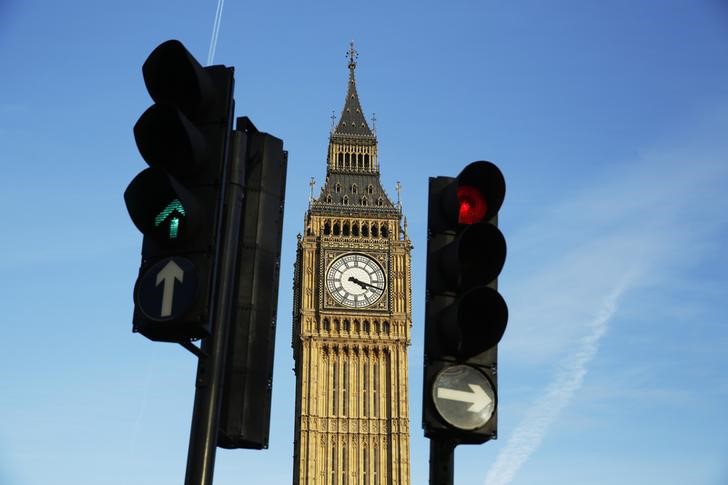PoundSterlingLIVE - Profile of Chancellor Rachel Reeves. Picture by Kirsty O'Connor / HM Treasury.
The state will play an increasingly dominant role in the UK economy, warns the British Chambers of Commerce (BCC).
One of the UK's most accurate forecasters has lowered its UK GDP growth forecasts owing to the government's national insurance hike.
The BCC, one of the UK's top-rated forecasters, said it had lowered its UK growth forecast for 2024, projecting GDP to grow by just 0.8%, down from 1.1%.
However, growth estimates for 2025 and 2026 have been revised upwards to 1.3% and 1.5%, respectively, due to anticipated increases in government spending.
Government spending is, therefore, expected to drive economic growth in the coming years, but businesses will continue to feel the fallout from rising costs and the tough autumn Budget.
"While government spending will underpin economic growth next year, businesses will be left licking their wounds as the fallout from the tough autumn Budget continues," warns Vicky Pryce, Chair of the BCC Economic Advisory Council.
She said there is a need for a better government strategy to support businesses.
"The BCC forecast shows the likely impact of rising costs from changes such as national insurance. This means business investment and jobs will be hit. As they face a difficult 2025, firms need reassurance the Government can very quickly outline a clearer framework to boost growth and business investment," Pryce said.
The BCC's quarterly economic forecast team won the 2024 FocusEconomics award for best GDP forecast. The group's findings suggest the state is eating the private sector as higher taxes are required to pay for increased spending levels.
"Our research continues to show that most SMEs are not increasing investment amidst an array of rising costs and admin burdens," says David Bharier, Head of Research at the BCC.
"Our forecast expects the national insurance hike, alongside other growing cost pressures on business, to impact on several economic indicators over the coming months," he adds.
Chancellor Rachel Reeves announced in October the government planned to increase spending by £70BN per year over the next five years. Reeves announced a significant £40BN increase in taxes, mainly aimed at businesses, to help fund the spending increase.
The BCC says the UK's inflation rate is expected to remain slightly above the Bank of England's 2% target, hitting 2.4% in 2024 before falling to 2.2% in 2025 and 2.0% in Q4 2026.
Interest rates are forecast to be 4.0% at the end of 2025, down from 4.75% today (implying just three rate cuts next year), and fall to 3.50% in 2026.
Business investment is forecast to grow by 1.5% in 2024 but slow to 0.9% in 2025 before recovering to 2.1% in 2026.
Rising employment costs are also set to restrict wage growth and hiring. Unemployment is expected to rise to 4.5% in 2025 before easing to 4.2% in 2026.
"The knock-on effect of rising business costs is likely to restrict wage growth in the short term and employment, as firms struggle to pass on costs and boost recruitment," Bharier noted.
Trade is expected to remain a weak spot for the UK economy, with exports growing by just 0.2% in 2025 and 1.1% in 2026. Imports are projected to contract slightly in 2025 before modest growth resumes. Net trade is forecast to stay negative throughout the period, reflecting ongoing challenges such as EU trade barriers and global disruptions.
“With fears of a tariff war and continued trade barriers with the EU, international trade will be challenging for many firms,” Bharier said.
He also stressed the need for immediate action, stating, "It's vital that business rate reform is accelerated and much-anticipated strategies on industry, infrastructure and trade deliver at pace in the months to come."
Sectoral Growth and Long-Term Outlook
Growth prospects vary across sectors, with manufacturing projected to grow by 0.6% in 2025 and 1.2% in 2026, while construction is expected to expand by 1.4% in 2025 and 1.5% in 2026. However, the broader economic landscape remains fragile.
Bharier summed up the challenges ahead, stating, “Our surveys already showed a fall in business confidence before October’s Budget. While the full impact of the Chancellor’s statement is yet to be seen, businesses face tough decisions as bills rise.”
The BCC’s forecast underscores the need for swift government action to address mounting challenges and provide businesses with the clarity needed to navigate an uncertain future.
An original version of this article can be viewed at Pound Sterling Live
